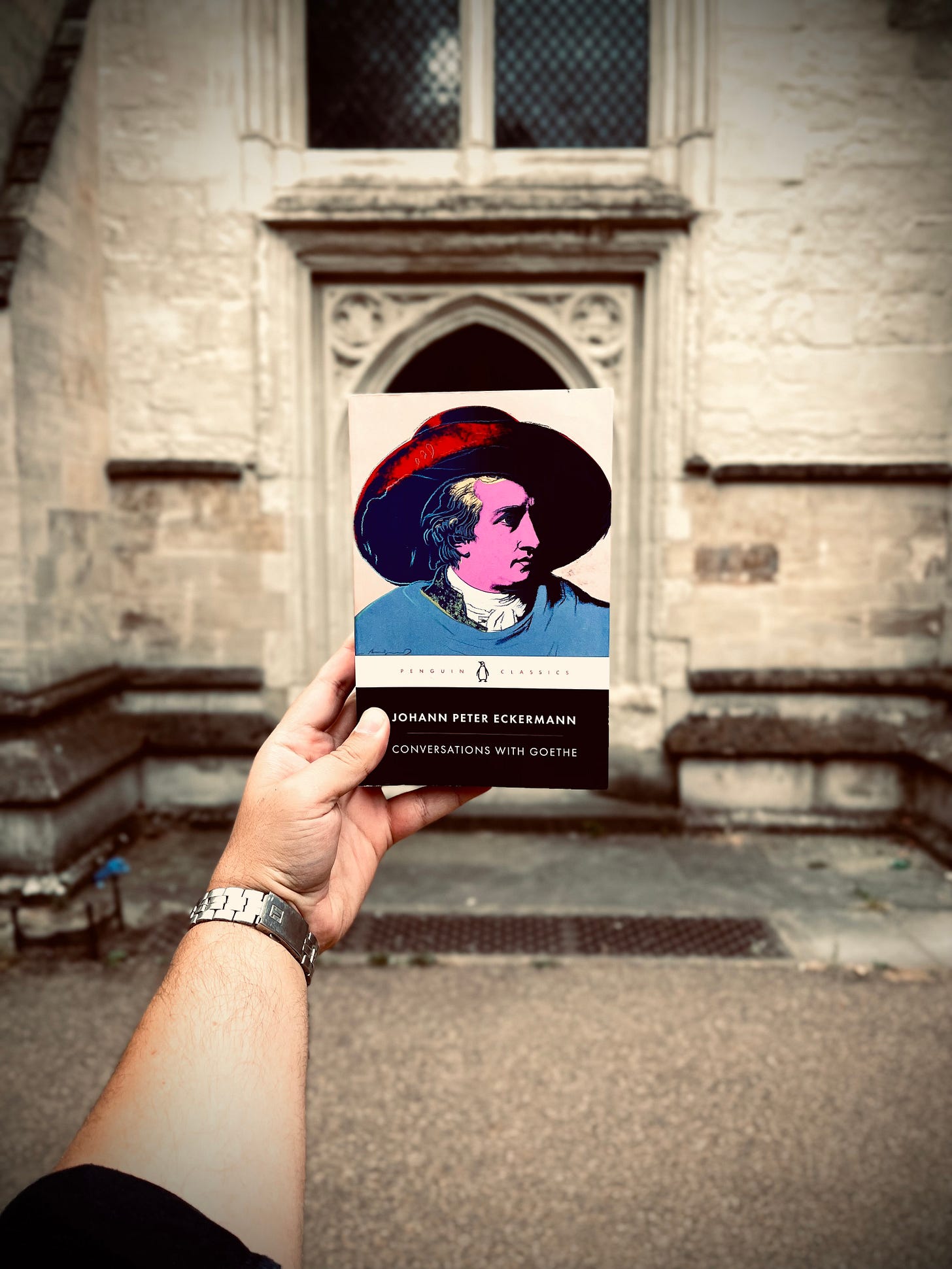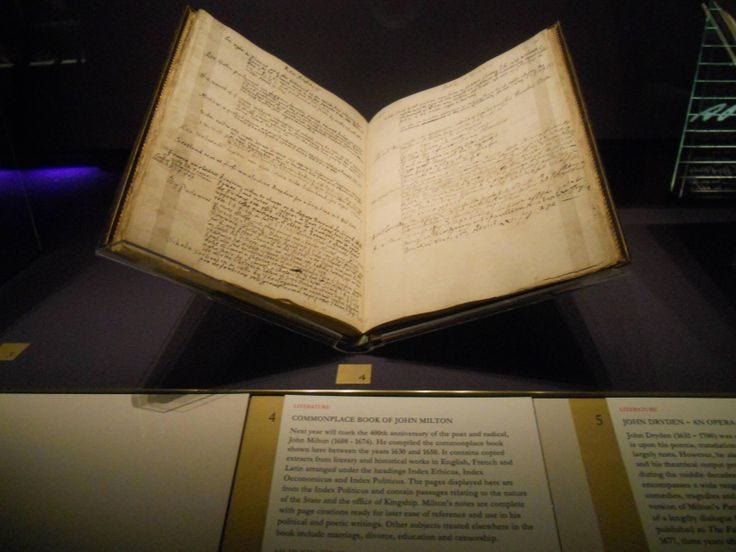‘The best German book there is.’
~ Nietzsche on Eckermann’s Conversations with Goethe.
Italy has Dante, England has Shakespeare, but Germany has — Johann Wolfgang von Goethe.
The former two, however, dedicated their lives almost exclusively to writing, whereas Goethe was an inborn polymath.
One can joke and say that if Dante and Da Vinci had a son, he definitely would have resembled Goethe in character.
Goethe shared Dante’s literary talent and Da Vinci’s intense curiosity. His tragic play Faust is as ingrained into the German psyche as Dante’s Divine Comedy is ingrained in the Italian.
His scientific investigations delved into architecture, colour, geology, morphology, and botany.
Goethe witnessed historical events that continue to echo in our century.
In a letter to a friend he wrote:
“I was born at a time when the most momentous world events were taking place…I was a living witness to the Seven Years’ War, then a separation of America from Britain, then the French Revolution, and finally the whole Napoleonic era, until the downfall of that heroic figure..”
Goethe truly lived an epic life and attracted many worshippers, and many of those worshippers wanted Goethe to promote their works.
In those cases, Goethe’s secretary used to dismiss them with a polite reply. There was one worshipper, however, who was smart enough not to be presumptuous.
His name was Johann Peter Eckermann.
Instead of boldly sending his works to Goethe, Eckermann decided first to acquaint himself with Goethe’s close inner circle. Then he sent some of his works to a magazine that Goethe used to edit. His final step was visiting Goethe in Weimar. By the time they met in person, Goethe was already familiar with the young man and recognised Eckermann’s talents.
Goethe became a friend and mentor to Eckermann, who, for the last nine years of Goethe’s life, recorded their conversations on a variety of topics, from literature and art to science and philosophy.
In one of their first dialogues, Goethe gives Eckermann unique advice on what young artists should do and follow to become great.
I. Why do artists get stuck?
‘Beware of embarking on a great work. This is the mistake that our best minds make, the very people with the most talent and the fiercest ambition.’
Don’t set your goals too high.
Don’t try to write a novel, if you’ve never written a short story. Da Vinci used to draw stones, hills, and rivers before he embarked on creating his masterpieces such as ‘The Last Supper’ or ‘The Mona Lisa’
Goethe warns us that:
‘It requires a vast amount of exertion and mental effort just to shape and organise a great whole, and a vast amount of energy, plus a period of uninterrupted peace and quiet in one’s life, to get it all down on paper in one continuous draft.’
Instead, you should focus on smaller pieces and pay attention to daily life, more on this in the next point.
II. How to Stop Overthinking?
‘The present demands its due; the thoughts and feelings that crowd in upon the poet every day need to be put into words, and so they should be. But if your mind is taken up with some great work, nothing else can get a look-in; all other thoughts are pushed aside, and you cannot even enjoy the ordinary pleasures of life.’
“The secret to genius is to know how to see beauty in daily life” — almost every great writer said this in one form or another.
In his letters, for example, Rainer Maria Rilke wrote:
“If your daily life seems poor, do not blame it; blame yourself, tell yourself that you are not poet enough to call forth its riches; for to the creator there is no poverty and no poor indifferent place.”
Grand goals can distract us from real life. We often try to run before we learn how to walk. We must learn how to tame our ambition and appreciate what lies in front of us.
‘This is exactly what the poet is for: he has the mind and the imagination to find something of interest in everyday things.’
We tend to overthink when we place our goals so far beyond the horizon, that we forget what were those goals in the first place. Goethe tells us to focus on our immediate surroundings, to pay attention, to love, and to enjoy life today.
What you pay attention to will define, for you, what reality is.
III. How to Find Your Artistic Voice?
“Keep it spontaneous, just the things that present themselves each day — and generally speaking you will always produce something good, and each day will bring you joy… Always follow your instincts.”
Every great writer, singer, and painter had a unique artistic voice. Those who are familiar with Virginia Woolf can recognise her writing style from just a few sentences; it takes me just two seconds to recognise Nina Simone’s or Edith Piaf’s voice, and in the case of Caravaggio it takes one to see just a single work by him to recognise his other masterpieces.
Finding your own artistic voice is like discovering your fingerprints. It is unique. It is what defines you as an artist in the first place. Without you drown in the ocean of other voices.
After learning how to stay present and finding beauty in daily life, you will have to express it, and here is the important part — you have to do it spontaneously.
Spontaneity reveals your true self, your true beliefs, and your true passions.
Overthinking, in contrast, kills original thinking.
Goethe says that ‘the world is so vast and rich, and life so full of variety, that you will never be short of inspiration’. When inspiration strikes you, take a pause, and write what you feel down straight away, before you lose your muse.
In a month or two, you will read what you had written and you will hear your own genuine and authentic voice. Yes, it might be clumsy. Yes, you might sound simple to your ears, but at least, you will hear your own artistic voice.
Many people never discover their artistic voice, because they never get a chance to hear it. To hear it they have to pay attention, to see beauty, to practice spontaneity.
Everything you’ve read above is described on a single page of Eckermann’s Conversations with Goethe. There are 642 more pages in this book. Hence you can imagine the density of ideas and insight into philosophy, literature, painting, and architecture that this book contains.
I wrote this article spontaneously. I wanted to practice this advice before preaching it to my reader. I got inspired by Goethe’s words, so I sat down and wrote this piece in one spontaneous movement, and only occasionally looking at the book so I could copy quotes correctly.
I hope it was a useful and pleasant read for you my reader.
I am certain that I am going to share with you more ideas that I encounter in this book in future posts.
This article was originally published in September, 2022 on Medium.
I no longer write there, so thought I would share some of the pieces here.
Do you want to keep a journal? (Patreon)
I’ve been journaling for the past 15 years of my life. By saying this I mean that for the past decade and a half, I’ve been sitting down, consistently, every day, and writing my thoughts and ideas into my notebook.
If you would like to begin your journaling journey, but don’t know where to start, how to stay consistent, or which type of journaling suits you, consider subscribing to my Patreon page.
I’ve made several ‘Guided journaling’ videos, where we sit down and journal together, I give journaling tips based on science, and I share some very personal pieces of advice based on my own journey.






I had just returned from two delightful weeks with Eckermann and Goethe, when I read Michael Hofmann's arrogant, snarky review of this book in the NYRB. His biggest beef seems to be that Eckermann was not extraordinary, and that Goethe exploited him. He seems to dislike and dismiss Goethe, which makes one wonder why he took on this assignment. My own review of the Conversations was part of a longer essay about the metaverse and can be read here: https://3quarksdaily.com/3quarksdaily/2022/09/a-metaverse-of-ones-own.html
Love it. Goethe is among the greatest exemplars of sagacity.